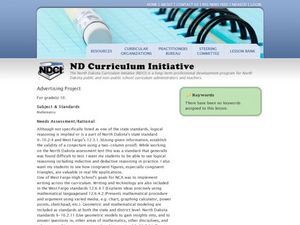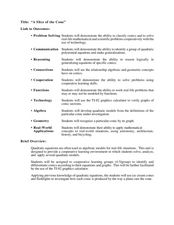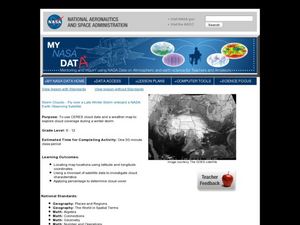Curated OER
Deductive and Inductive Reasoning
Students differentiate between inductive and deductive reasoning. In this geometry lesson, students identify congruent figures and examine logos for congruency.
Curated OER
Deductive Reasoning
Tenth graders investigate deductive reasoning. In this geometry lesson, 10th graders compare and contrast inductive ns deductive reasoning. Students use deductive reasoning to investigate algebraic proof and explore deductive...
Curated OER
Two Column Logic Proofs
Students complete two column proofs. For this geometry lesson,students derive the reasons their answers are correct using logic. They write the proof step by step using two columns.
Curated OER
Logic and Proof Writing
Students define inductive and deductive reasoning and write two column proofs. In this geometry lesson, students analyze arguments and draw conclusion. They define steps necessary to arrive at the correct answer when completing proofs.
Curated OER
U Boat Hunt
Students recognize patterns and sequences in numbers. In this geometry lesson, students create rules to define the sequences and patterns they obsere. They translate coded messages as they dicuss navigational terms.
Curated OER
Preparation and Transition to Two-Column Proofs
Students investigate proofs used to solve geometric problems. In this geometry lesson, students read about the history behind early geometry and learn how to write proofs correctly using two columns. The define terminology valuable to...
Curated OER
Water Treatment Plant Tour
Students define vocabulary related to geometry and calculate the volume. In this geometry lesson, students calculate flow rates, and volume as it relates to a water plant facility. They calculate the volume of three dimensional shapes...
Curated OER
Quadrilateral Explorations-Grade Nine
Ninth graders investigate quadrilaterals. In this geometry lesson plan, 9th graders examine and classify quadrilaterals using the slope, midpoint and distance formulas. Additionally, students create various quadrilaterals...
EngageNY
Construct an Equilateral Triangle (part 1)
Drawing circles isn't the only thing compasses are good for. In this first installment of a 36-part series, high schoolers learn how to draw equilateral triangles by investigating real-world situations, such as finding the location of a...
Shodor Education Foundation
Sets and the Venn Diagram (Beginner)
Venn diagrams are helpful in understanding the idea of a set and using attributes to sort items. This basic plan is an introduction with an added bonus of an applet that can be used to demonstrate the activity. If a classroom of...
Curated OER
"A Slice of the Cone"
Here is a set of lessons that explore conics in a number of different ways. Starting with modeling how a conic is produced by the way a plane cuts the cone, to solving complex word problems, algebra learners progress through a series of...
Radford University
Parallel Lines, Transversals, and Angles: What’s the Connection?
Streets, bridges, and intersections, oh my! Parallel lines and transversals are a present in the world around us. Learners begin by discovering the relationship of the angles formed by parallel lines and a transversal. They then...
Curated OER
Storm Clouds-- Fly over a Late Winter Storm onboard a NASA Earth Observing Satellite
Students study cloud data and weather maps to explore cloud activity. In this cloud data instructional activity students locate latitude and longitude coordinates and determine cloud cover percentages.
Curated OER
Cruising the Internet
Students identify the parts of an engine using a graph. In this statistics lesson, students make a graph from their collected data. They calculate the volume of a cylinder using a line of regression and a scatter plot.













